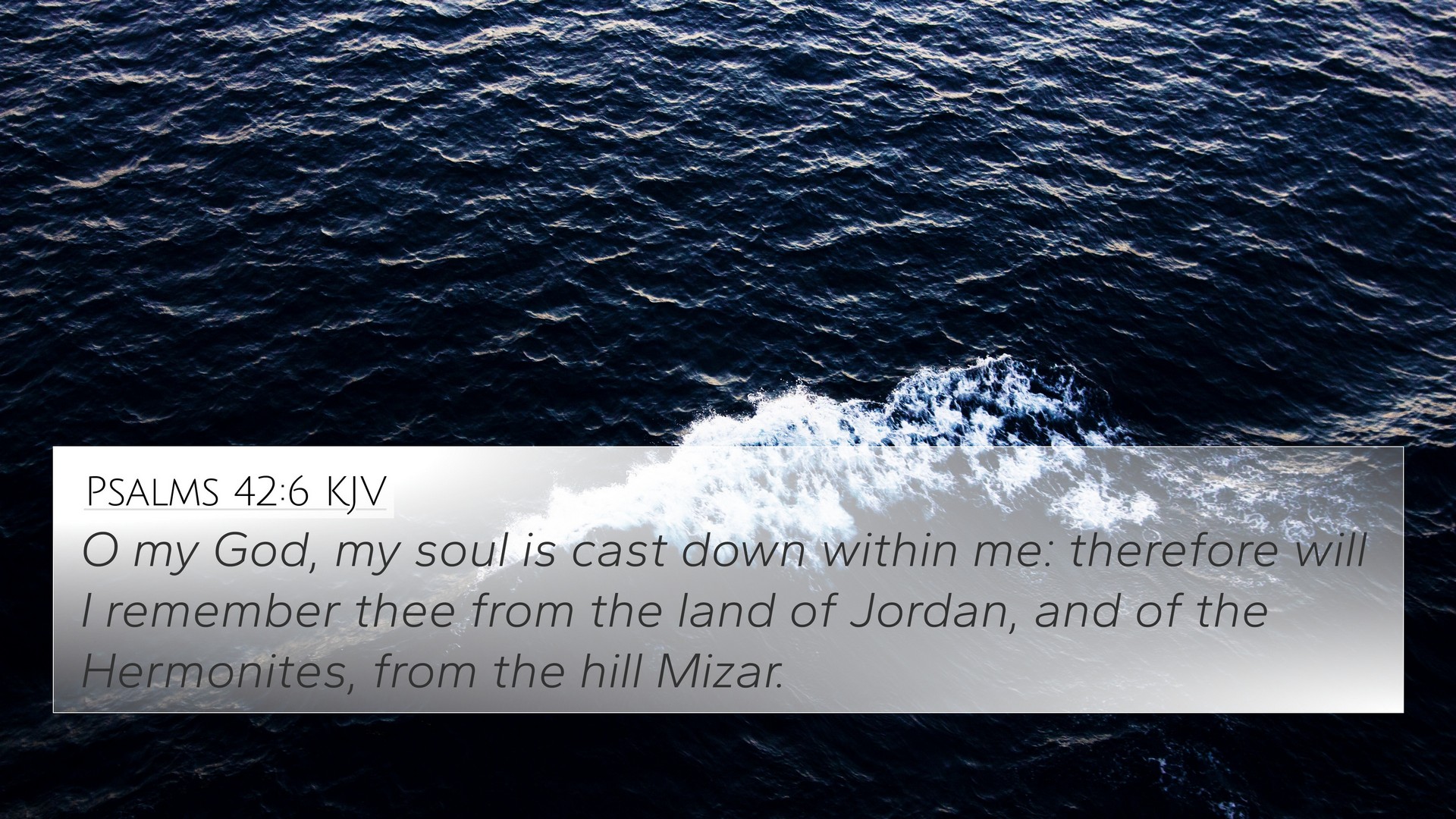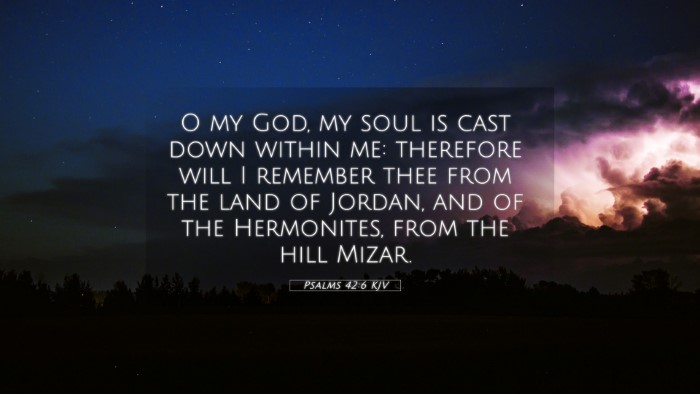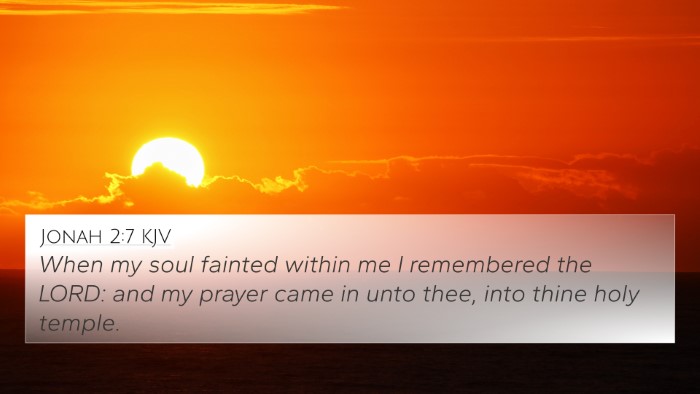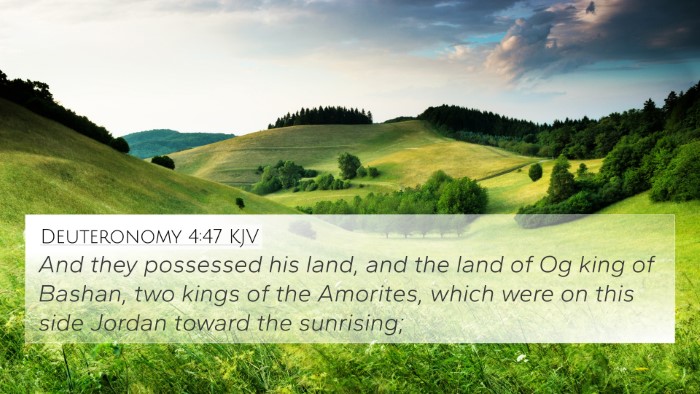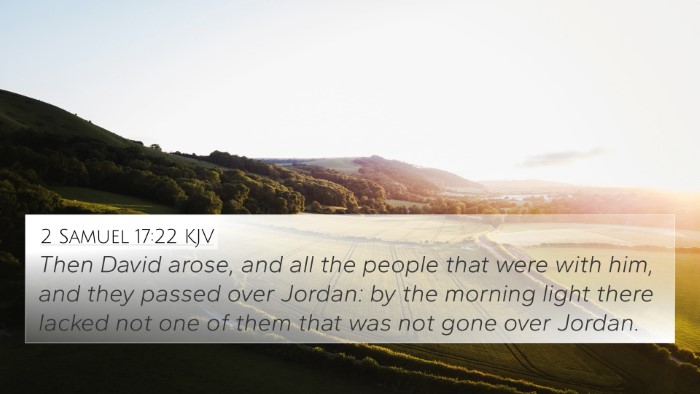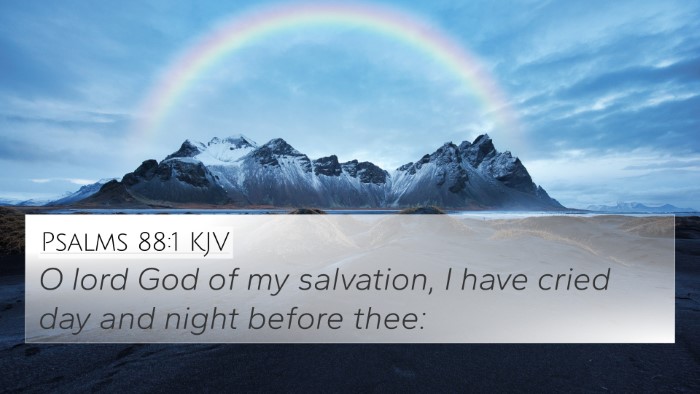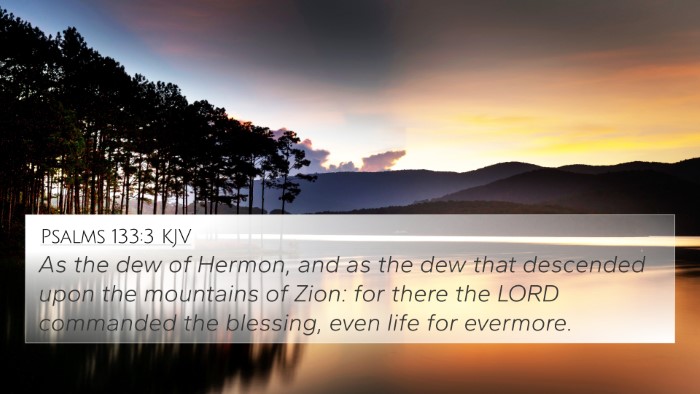Psalms 42:6 Explained: A Comparative Bible Verse Analysis
Psalms 42:6 states:
"O my God, my soul is cast down within me: therefore will I remember thee from the land of Jordan, and of the Hermonites, from the hill Mizar."
This verse reflects deep emotional turbulence and a longing for connection with God, typical of the psalmist’s experience. Below, we explore the meaning of this verse through various public domain commentaries and its connections with other Scriptures.
Understanding Psalms 42:6
The psalmist opens with a confession of sadness and despair. This verse encapsulates the essence of longing and the remembrance of God in times of trouble. Using commentaries from Matthew Henry, Albert Barnes, and Adam Clarke, we can derive profound meanings from the text:
- Matthew Henry: He emphasizes that the psalmist's soul is deeply troubled. The term "cast down" expresses a feeling of being overwhelmed by sorrow, indicating a need for divine solace. The reference to the Jordan and Mizar highlights a geographical and spiritual distance from God, yet the psalmist resolves to remember God despite the distance.
- Albert Barnes: Barnes suggests that even in despair, the act of remembering God is a pivotal response. The mention of specific geographical locations symbolizes the psalmist's isolation, yet he demonstrates faith by recalling the past blessings and guidance of God. This remembrance serves as a lifeline in his current state of affliction.
- Adam Clarke: Clarke reflects on the historical and poetic dimensions of the verse, noting the significance of the Hermonites, as a place of refuge and strength. The hill Mizar illustrates the highs and lows of spiritual experience, resonating with the psalmist's cry for help. Clarke encourages readers to draw on God’s past deliverance to find strength in present trials.
Cross-References Related to Psalms 42:6
Psalms 42:6 can be connected to several other verses that elaborate on similar themes of longing, despair, and hope in God:
- Psalms 43:5: "Why art thou cast down, O my soul? and why art thou disquieted within me? Hope in God; for I shall yet praise him." - This verse echoes the sentiment of self-reflection and encouragement to hope in God.
- Jeremiah 29:13: "And ye shall seek me, and find me, when ye shall search for me with all your heart." - Highlights the importance of seeking God earnestly during difficult times.
- Matthew 11:28: "Come unto me, all ye that labour and are heavy laden, and I will give you rest." - Jesus invites the weary to find rest in Him, aligning with the psalmist's search for comfort.
- 2 Corinthians 1:3-4: "Blessed be God, even the Father of our Lord Jesus Christ, the Father of mercies, and the God of all comfort; who comforteth us in all our tribulation." - This New Testament passage underscores God’s role as a comforter in times of trouble.
- Isaiah 41:10: "Fear thou not; for I am with thee: be not dismayed; for I am thy God: I will strengthen thee; yea, I will help thee; yea, I will uphold thee with the right hand of my righteousness." - A promise of divine support that resonates with the psalmist's situation.
- Philippians 4:6-7: "Be careful for nothing; but in everything by prayer and supplication with thanksgiving let your requests be made known unto God." - Encourages turning to God in prayer, aligning with the psalmist's longing for divine presence.
- Hebrews 13:5: "For he hath said, I will never leave thee, nor forsake thee." - Reinforces God’s unwavering presence, especially important during feelings of abandonment.
- Romans 8:38-39: "For I am persuaded, that neither death, nor life, nor angels, nor principalities, nor powers, nor things present, nor things to come, nor height, nor depth, nor any other creature, shall be able to separate us from the love of God." - Beautifully assures believers of God’s unbreakable love and support.
Thematic Connections Between Bible Verses
The verse serves as a reminder of the overarching themes of hope and redemption found throughout Scriptures. Here are some thematic connections and how they interrelate:
- Longing for God: The genuine yearning expressed in Psalms 42:6 connects with longing themes found in other Psalms, such as Psalms 63:1, where the psalmist thirsts for God in a dry and weary land.
- Divine Help in Distress: Verses like Psalms 46:1 - "God is our refuge and strength, a very present help in trouble" - echo the theme of seeking God’s assurance during hardship.
- Remembrance as a Faith Tool: The practice of remembering God's past faithfulness, as seen in Psalms 77:11-12, where the psalmist recalls the deeds of the Lord, reinforces the need to recall God’s past interventions.
Tools for Bible Cross-Referencing
When studying Bible verses, using tools for cross-referencing can enhance understanding:
- Bible Concordance: A tool that provides a list of words used in the Bible and their occurrences, assisting in exploring themes and connections.
- Bible Cross-Reference Guide: A resource for identifying related verses, allowing believers to see connections within Scripture.
- Cross-Reference Bible Study: Methods that guide individuals to study the Bible in relational contexts, comparing cross-references to reveal deeper meanings.
How to Use Bible Cross-References
Understanding the connections between Bible verses can deepen faith and comprehension of God's Word:
- Identify keywords in the verse you are studying.
- Utilize a concordance to find occurrences of these keywords throughout the Bible.
- Make connections between verses thematically and contextually to see how they support or contrast each other.
Conclusion
Psalms 42:6 serves as a poignant reminder of the human struggle, the quest for understanding, and the importance of remembering God in challenging times. The insights from revered commentaries and the collective wisdom of interconnected Scriptures offer encouragement to those who may feel isolated or burdened. By utilizing cross-referencing methods, believers can glean more profound insights into their faith as they journey through the Scriptures.
